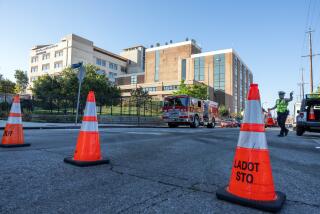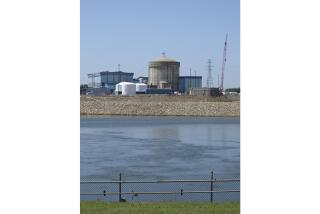Management Blamed for A-Plant Errors
- Share via
WASHINGTON — Senior officials at the Department of Energy said Wednesday that operator errors that damaged pipes and valves in a nuclear reactor at Savannah River in South Carolina last weekend point to a persistent, “fundamental management problem” that may further delay restarting this crucial weapons production plant.
Officials told a congressional hearing that the incident, which followed a routine test of the dormant reactor, appeared to have caused no serious damage.
But they voiced concern that the operator errors that led to the mishap--and the failure of plant managers to report the incident for nearly three days--reflected a stubborn complacency toward safety hazards that months of effort have failed to root out.
The incident on Sunday, moreover, raised the specter of further delays in restarting the reactors, which are the government’s only source of tritium gas, a component of nuclear weapons that must be replenished periodically.
The several hundred million dollars the government is spending on modernizing the plant’s three tritium-production reactors as well as the intensive retraining of operators “cannot overcome the fundamental management problem” that persists at Savannah River, the energy department’s chief safety official, Richard Starostecki, told the Senate Governmental Affairs Committee.
The E. I. du Pont de Nemours & Co., which has operated the Savannah River facility under government contract since the 1950s, is turning the plant over to the Westinghouse Corp. on April 1. Nearly all of the 6,500 employees will retain their jobs, however, with only about 40 top managers to be replaced in the transition.
Savannah River’s three production reactors were shut down last year, initially for safety inspections and hardware improvements. But when it took a closer look at the plant’s management, the energy department found the quality of operator training and safety procedures lagged far behind the standards of commercial nuclear power plants.
Troy E. Wade II, the energy department official in charge of weapons production, told the committee that an extra shift of reactor operators had been added at Savannah River so that one shift was constantly undergoing training. But he said: “Clearly, this hasn’t helped as we thought it would.”
The mishap on Sunday involved a routine pressure test on a secondary cooling system of the K-reactor, the one officials hope to restart first, this summer. The test, which required locking several valves in an open position, was completed successfully, Wade said, but then operators forgot to allow one of the valves to close.
When the complex cooling system failed to behave normally, operators pumped more water into it, over-pressurizing and cracking at least one valve, rather than stopping to analyze the problem. This violated a basic safety dictum, officials said, that requires an understanding of “off-normal” reactor behavior before trying to correct it.
More to Read
Sign up for Essential California
The most important California stories and recommendations in your inbox every morning.
You may occasionally receive promotional content from the Los Angeles Times.













